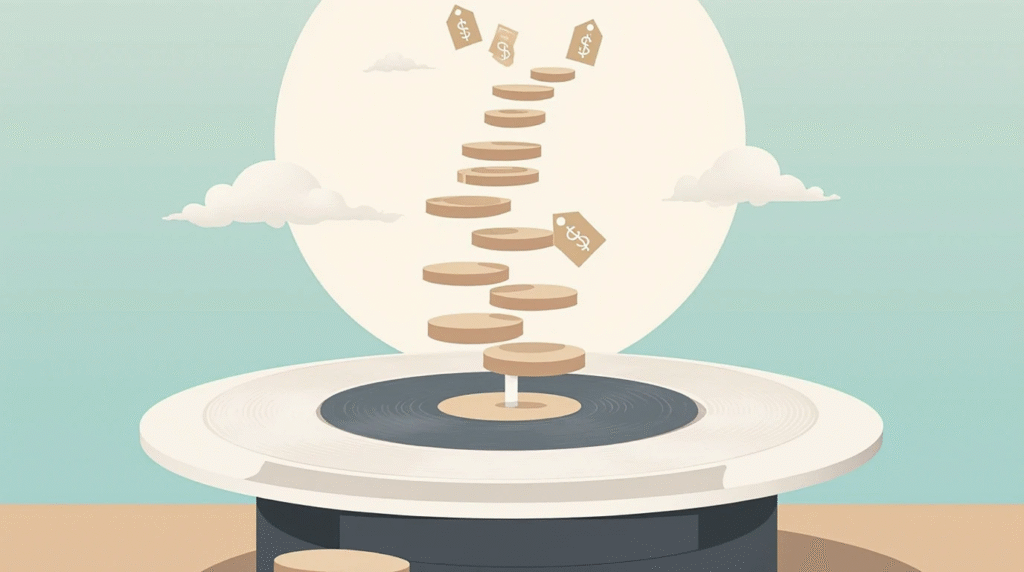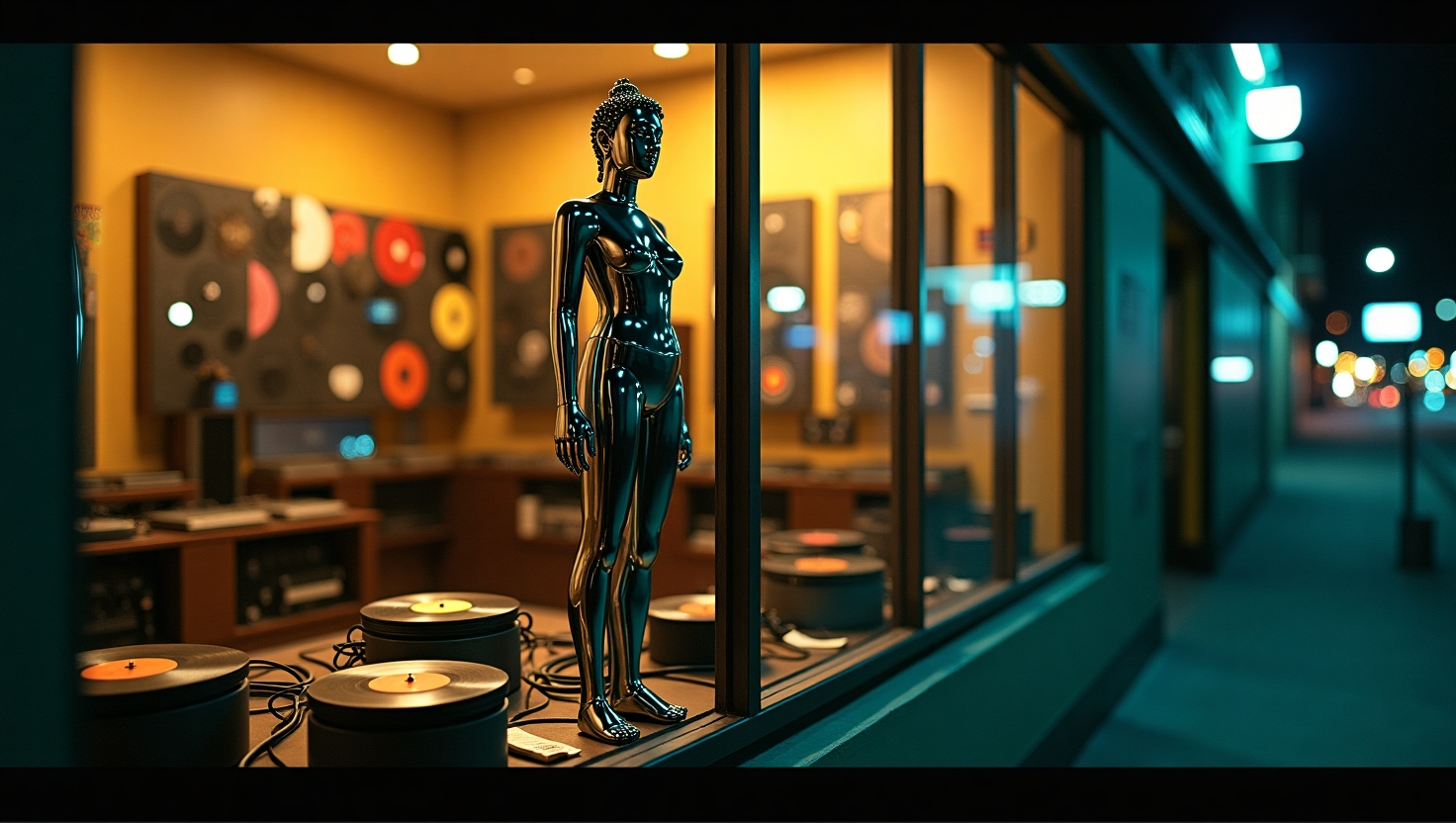Steely Dan’s Bodhisattva is a grin behind dark glasses: a joyride groove with a lyrical sting. If you’re hunting steely dan bodhisattva lyrics meaning, you’ll find a polished satire that dances on the fault line between wanting to be enlightened and wanting the perks. The band’s early line-up — Donald Fagen and Walter Becker, with Denny Dias, Jeff “Skunk” Baxter, and Jim Hodder — tracked it for ABC Records on the 1973 album Countdown to Ecstasy.
That context matters: the song’s immaculate playing is part of the joke. It sounds like a turbocharged pilgrimage but keeps swerving into showroom windows. In classic Dan fashion, Bodhisattva was “recorded in a desultory haphazard” blur only in spirit; the execution is razor-clean, which is why fans still debate steely dan bodhisattva lyrics meaning decades later.
The title nods to Buddhist compassion — a being who delays nirvana to help others awaken — yet the narrator acts like a seeker who wants fast-tracked salvation with airport-lounge benefits. That contradiction fuels the song’s bite: materialism vs spirituality framed as a sales pitch. It’s prime satire in rock lyrics, and a perfect case study in steely dan lyric analysis.
Beneath the motorik shuffle and piano snaps, the chorus line “bodhisattva would you take me by the hand” begs for enlightenment like it’s a concierge service. Elsewhere, the pledge “I’m gonna sell my house in town” (often remembered as “bodhisattva I’m gonna sell…”, or “gonna sell my house”) is spiritual enthusiasm expressed as a property liquidation — liberating, perhaps, but still framed as a transaction. In short, steely dan bodhisattva lyrics meaning lives in this tension: a sincere yearning voiced in the language of the showroom. That’s why Bodhisattva stands out as eastern philosophy in 70s music filtered through American consumer sparkle.
The playing seals the joke. Guitarists Denny Dias and Jeff “Skunk” Baxter trade blistering breaks, the band accelerates like a precision engine, and Donald Fagen’s vocal keeps a cool distance. If Bodhisattva were a straight sermon, it would feel earnest; instead it’s a chrome-bright send-up of hustled enlightenment — and a reminder that why history repeats itself often boils down to how we dress up our cravings. No wonder the track is a favourite for live showcases: it’s exuberant, funny, and slightly cruel — which is to say it’s quintessential Dan.
Steely Dan Bodhisattva lyrics meaning — the satire under the shine
Steely Dan’s writing often reads like noir short stories set to hi-fi jazz-rock; Bodhisattva is one of their cleanest jokes. On paper, the narrator promises to “sell my house in town” and go all-in. In sound, the band makes transcendence feel like a sports car launch. That gap is the thesis. If you’re asking why do we repeat the same mistakes, Bodhisattva answers: because the old desire keeps wearing a new suit. It’s not that yearning is fake; it’s that the sales voice in our head keeps repackaging it. This is materialism vs spirituality not as a debate, but as a jingle.
As an exercise in steely dan lyric analysis, count the contradictions: holy vocabulary deployed like ad copy, sacrificial zeal expressed as a bullish asset sale, and a road-movie groove that outruns every doubt. Within eastern philosophy in 70s music, few songs mock the modern seeker with such affection. You can want the real thing and still want it first-class. That’s the very human knot at the heart of steely dan bodhisattva lyrics meaning.
And yet the affection is real. You don’t arrange music this lovingly unless you recognise the yearning. The joke lands because the band includes itself: connoisseurs who know the taste of luxury poking fun at aspiration dressed as enlightenment. That duality explains why history repeats itself inside us — we try to swap the goal but keep the incentives. If you’ve ever promised a clean slate tomorrow, Bodhisattva is your theme tune.

Bodhisattva lyrics: satire, desire, and a wink
Let’s centre the words. The hook “bodhisattva would you take me by the hand” flips the Buddhist ideal into a concierge request; the line “I’m gonna sell my house in town” reads like renunciation, yet it’s framed as a transactional boast. That blend puts Bodhisattva alongside the best satire in rock lyrics: a spiritual billboard whose copywriter can’t stop polishing the chrome. Searchers hunting “bodhisattva lyrics by steely dan” or “bodhisattva by steely dan” often expect serenity; they get swagger with subtext.
Musically, the twin-lead fireworks by Dias and Baxter (with Jim Hodder laying down the urgent pulse) sketch a motorway to awakening, complete with fast lanes. Fagen and Becker knew exactly what they were doing: play transcendence like a chase scene and everyone will want in. That’s the punchline — and the reason steely dan bodhisattva lyrics meaning remains sticky long after the last cymbal fades.
If you’re building a themed path through RookieWriter, pair this with your Steely Dan companion piece, Do It Again — another study in cycles dressed as cool. Read alongside those, Bodhisattva rounds out a mini-suite on desire, repetition, and shine.
For group background and discography orientation, see the core profile of the band on Wikipedia — Steely Dan. It’s a handy primer if you’re new to their world and want to place Countdown to Ecstasy Steely Dan in context.
Side door comparisons and echoes
Across the site we’ve explored how polished music can smuggle serious themes. Do It Again maps the habit loop as a hook; Bodhisattva maps a prayer as a pitch. Put them together and you can see how satire in rock lyrics can still hold empathy — and how steely dan lyric analysis often ends at a human universal: we crave meaning, and we shop for it.
Members & label woven in
It bears repeating because it colours the reading: this is Countdown to Ecstasy-era Steely Dan — Donald Fagen (voice/keys) and Walter Becker (bass/guitars) steering the writing, with Denny Dias and Jeff “Skunk” Baxter trading speed-clean licks, and Jim Hodder driving the drums and harmonies — all pressed by ABC Records. Knowing who’s at the wheel sharpens any steely dan lyric analysis: these are studio perfectionists using perfection as part of the satire.
Why this still lands
Because the dilemma hasn’t gone anywhere. The marketplace now sells wellness and wisdom as aggressively as it sells watches. Bodhisattva doesn’t scold; it smirks and says, “Check the price tag.” That makes steely dan bodhisattva lyrics meaning feel current: the hook is eternal, and the hustle keeps updating.
Conclusion
Ultimately, Bodhisattva dazzles because it lets desire wear enlightenment’s clothes and still feels like a celebration. The fast-lane groove, diamond-cut guitars and deadpan vocal turn a sermon into satire, revealing how easily we shop for transcendence like a luxury option.
That’s the heart of steely dan bodhisattva lyrics meaning: a witty collision of materialism vs spirituality where the sales pitch keeps outshouting the still, small voice. Read this way, the chorus (“bodhisattva would you take…”) isn’t piety but a concierge request—funny, pointed, and painfully human. Which is why the track endures: it flatters our taste while nudging our conscience, reminding us that the road to insight isn’t a showroom test drive but a quieter, longer practice.




